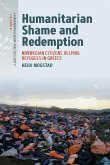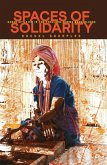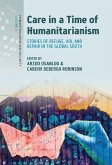Liliana Suárez-Navaz
Rebordering the Mediterranean (eBook, ePUB)
Boundaries and Citizenship in Southern Europe
29,95 €
29,95 €
inkl. MwSt.
Sofort per Download lieferbar

15 °P sammeln
29,95 €
Als Download kaufen

29,95 €
inkl. MwSt.
Sofort per Download lieferbar

15 °P sammeln
Jetzt verschenken
Alle Infos zum eBook verschenken
29,95 €
inkl. MwSt.
Sofort per Download lieferbar
Alle Infos zum eBook verschenken

15 °P sammeln
Liliana Suárez-Navaz
Rebordering the Mediterranean (eBook, ePUB)
Boundaries and Citizenship in Southern Europe
- Format: ePub
- Merkliste
- Auf die Merkliste
- Bewerten Bewerten
- Teilen
- Produkt teilen
- Produkterinnerung
- Produkterinnerung

Bitte loggen Sie sich zunächst in Ihr Kundenkonto ein oder registrieren Sie sich bei
bücher.de, um das eBook-Abo tolino select nutzen zu können.
Hier können Sie sich einloggen
Hier können Sie sich einloggen
Sie sind bereits eingeloggt. Klicken Sie auf 2. tolino select Abo, um fortzufahren.

Bitte loggen Sie sich zunächst in Ihr Kundenkonto ein oder registrieren Sie sich bei bücher.de, um das eBook-Abo tolino select nutzen zu können.
Offering a rich ethnographic account, this book traces the historical processes by which Andalusians experienced the shift from being poor emigrants to northern Europe to becoming privileged citizens of the southern borderland of the European Union, a region where thousands of African immigrants have come in search of a better life. It draws on extended ethnographic fieldwork in Granada and Senegal, exploring the shifting, complementary and yet antagonistic relations between Spaniards and African immigrants in the Andalusian agrarian work place. The author's findings challenge the assumption…mehr
- Geräte: eReader
- mit Kopierschutz
- eBook Hilfe
- Größe: 1.96MB
Andere Kunden interessierten sich auch für
![Heirs of the Bamboo (eBook, ePUB) Heirs of the Bamboo (eBook, ePUB)]() Marisa C. GasparHeirs of the Bamboo (eBook, ePUB)29,95 €
Marisa C. GasparHeirs of the Bamboo (eBook, ePUB)29,95 €![Humanitarian Shame and Redemption (eBook, ePUB) Humanitarian Shame and Redemption (eBook, ePUB)]() Heidi MogstadHumanitarian Shame and Redemption (eBook, ePUB)29,95 €
Heidi MogstadHumanitarian Shame and Redemption (eBook, ePUB)29,95 €![Heirs of the Greek Catastrophe (eBook, PDF) Heirs of the Greek Catastrophe (eBook, PDF)]() Renée HirschonHeirs of the Greek Catastrophe (eBook, PDF)29,95 €
Renée HirschonHeirs of the Greek Catastrophe (eBook, PDF)29,95 €![The Annoying Difference (eBook, ePUB) The Annoying Difference (eBook, ePUB)]() Peter HervikThe Annoying Difference (eBook, ePUB)29,95 €
Peter HervikThe Annoying Difference (eBook, ePUB)29,95 €![The Hidden Minority (eBook, ePUB) The Hidden Minority (eBook, ePUB)]() Helena JermanThe Hidden Minority (eBook, ePUB)29,95 €
Helena JermanThe Hidden Minority (eBook, ePUB)29,95 €![Spaces of Solidarity (eBook, ePUB) Spaces of Solidarity (eBook, ePUB)]() Rachel SharplesSpaces of Solidarity (eBook, ePUB)25,95 €
Rachel SharplesSpaces of Solidarity (eBook, ePUB)25,95 €![Care in a Time of Humanitarianism (eBook, ePUB) Care in a Time of Humanitarianism (eBook, ePUB)]() Care in a Time of Humanitarianism (eBook, ePUB)0,00 €
Care in a Time of Humanitarianism (eBook, ePUB)0,00 €-
-
-
Offering a rich ethnographic account, this book traces the historical processes by which Andalusians experienced the shift from being poor emigrants to northern Europe to becoming privileged citizens of the southern borderland of the European Union, a region where thousands of African immigrants have come in search of a better life. It draws on extended ethnographic fieldwork in Granada and Senegal, exploring the shifting, complementary and yet antagonistic relations between Spaniards and African immigrants in the Andalusian agrarian work place. The author's findings challenge the assumption of fixed national, cultural, and socioeconomic boundaries vis-à-vis outside migration in core countries, showing how legal and cultural identities of Andalusians are constructed together with that of immigrants.
Dieser Download kann aus rechtlichen Gründen nur mit Rechnungsadresse in A, D ausgeliefert werden.
Produktdetails
- Produktdetails
- Verlag: Berghahn Books
- Seitenzahl: 280
- Erscheinungstermin: 1. August 2004
- Englisch
- ISBN-13: 9781782381907
- Artikelnr.: 40805943
- Verlag: Berghahn Books
- Seitenzahl: 280
- Erscheinungstermin: 1. August 2004
- Englisch
- ISBN-13: 9781782381907
- Artikelnr.: 40805943
- Herstellerkennzeichnung Die Herstellerinformationen sind derzeit nicht verfügbar.
Liliana Suárez-Navaz is Professor in the Social Anthropology Department at Autónoma University of Madrid.
Acknowledgments
Introduction
* Identities and Citizenship in the Andalusian Borderland
* Modernity in the Making: The Reinscription of Difference in a Legally
Bounded Space
* Culture and Gender in Ethnographic Work
Chapter 1. Peoples of Alfaya: The Relocation of Peasants in Southern Europe
* Peasants in Francoist Times
* Rights and the Experience of Emigration
* Irrigation, Intensive Labor, and the Autonomous Entrepreneur
* Politics of Change: The Social Vision of the Village
* The Price of Modernization: Loss of Autonomía in a Global Space
* A New Relationship with the State
* Alfaya in the Narratives of the Past: Inclusive versus Exclusive
Criteria of Belonging
* Summary and Preliminary Conclusions
Chapter 2. Contested Boundaries
* Crossing Boundaries
* The Making of a European Spain and Southern Immigrants
* Enactment of the Alien Law
* Andalusia's Muslim Imagery
* "Outsider" into "Foreigner": The First Case of Enforcement of the LOE
and Collective Resistance
* Act 1: Hailing and Resistance
* Act 2: Resistance to Expulsion and Nationalism That "Goes without
Saying,"
Chapter 3. Putting Immigrants in Their Place
* Landscapes of Inequality
* Africans in Alfaya: "No Place to Stay,"
* Sheltering the Homeless: Immigrants' Place as a Right and an Arena
for Consciousness-Building
* Putting Immigrants in Their (Social) Place
* Naturalizing Difference
Chapter 4. The Symbolic and Political Manufacturing of the Legitimation of
Legality
* Salir a la Luz: The 1991 Regularization Process
* Immigrants as Administered Subjects and the Fetishism of Papers
Chapter 5. The Imagining of Multicultural Convivencia in a Legally Bounded
Social Space
* Integration: The Imagining of Cultural Antagonism and Multicultural
Consent
* Local Implementation of Social Programs in the Summer of 1994
* The Politics of Invisibility: A Racial Geography of Labor Relations
Chapter 6. The Senegalese Transnational Social Space: Survival and Identity
in the Interstices of State Reproduction and Global Economy
* The Forging of a Modern National Tradition in Senegal: Black Islam,
Peripheral State, and Global Capitalism
* Tradition and Cosmopolitanism in Emigration: Reproduction and Change
in Senegalese Society
* Community in the Diaspora: The Construction of Granada as a
Senegalese Place (1980-1995)
* Strategies of Belonging and Structures of Power: The Challenge of a
Transnational Social Space
Chapter 7. A New Convivencia? Belonging and Entitlement from the Margins
* Convivencia and Citizenship from an Anthropological Perspective
* Convivencia at Home: The Case of Zoheir and the Blanco Family
* Work and Leisure: Rights as Workers, Respect as People
* Immigrants as Collective Subjects in the Public Social Space: A New
Convivencia in Granada?
Conclusion
Glossary
References
Index
Introduction
* Identities and Citizenship in the Andalusian Borderland
* Modernity in the Making: The Reinscription of Difference in a Legally
Bounded Space
* Culture and Gender in Ethnographic Work
Chapter 1. Peoples of Alfaya: The Relocation of Peasants in Southern Europe
* Peasants in Francoist Times
* Rights and the Experience of Emigration
* Irrigation, Intensive Labor, and the Autonomous Entrepreneur
* Politics of Change: The Social Vision of the Village
* The Price of Modernization: Loss of Autonomía in a Global Space
* A New Relationship with the State
* Alfaya in the Narratives of the Past: Inclusive versus Exclusive
Criteria of Belonging
* Summary and Preliminary Conclusions
Chapter 2. Contested Boundaries
* Crossing Boundaries
* The Making of a European Spain and Southern Immigrants
* Enactment of the Alien Law
* Andalusia's Muslim Imagery
* "Outsider" into "Foreigner": The First Case of Enforcement of the LOE
and Collective Resistance
* Act 1: Hailing and Resistance
* Act 2: Resistance to Expulsion and Nationalism That "Goes without
Saying,"
Chapter 3. Putting Immigrants in Their Place
* Landscapes of Inequality
* Africans in Alfaya: "No Place to Stay,"
* Sheltering the Homeless: Immigrants' Place as a Right and an Arena
for Consciousness-Building
* Putting Immigrants in Their (Social) Place
* Naturalizing Difference
Chapter 4. The Symbolic and Political Manufacturing of the Legitimation of
Legality
* Salir a la Luz: The 1991 Regularization Process
* Immigrants as Administered Subjects and the Fetishism of Papers
Chapter 5. The Imagining of Multicultural Convivencia in a Legally Bounded
Social Space
* Integration: The Imagining of Cultural Antagonism and Multicultural
Consent
* Local Implementation of Social Programs in the Summer of 1994
* The Politics of Invisibility: A Racial Geography of Labor Relations
Chapter 6. The Senegalese Transnational Social Space: Survival and Identity
in the Interstices of State Reproduction and Global Economy
* The Forging of a Modern National Tradition in Senegal: Black Islam,
Peripheral State, and Global Capitalism
* Tradition and Cosmopolitanism in Emigration: Reproduction and Change
in Senegalese Society
* Community in the Diaspora: The Construction of Granada as a
Senegalese Place (1980-1995)
* Strategies of Belonging and Structures of Power: The Challenge of a
Transnational Social Space
Chapter 7. A New Convivencia? Belonging and Entitlement from the Margins
* Convivencia and Citizenship from an Anthropological Perspective
* Convivencia at Home: The Case of Zoheir and the Blanco Family
* Work and Leisure: Rights as Workers, Respect as People
* Immigrants as Collective Subjects in the Public Social Space: A New
Convivencia in Granada?
Conclusion
Glossary
References
Index
Acknowledgments
Introduction
* Identities and Citizenship in the Andalusian Borderland
* Modernity in the Making: The Reinscription of Difference in a Legally
Bounded Space
* Culture and Gender in Ethnographic Work
Chapter 1. Peoples of Alfaya: The Relocation of Peasants in Southern Europe
* Peasants in Francoist Times
* Rights and the Experience of Emigration
* Irrigation, Intensive Labor, and the Autonomous Entrepreneur
* Politics of Change: The Social Vision of the Village
* The Price of Modernization: Loss of Autonomía in a Global Space
* A New Relationship with the State
* Alfaya in the Narratives of the Past: Inclusive versus Exclusive
Criteria of Belonging
* Summary and Preliminary Conclusions
Chapter 2. Contested Boundaries
* Crossing Boundaries
* The Making of a European Spain and Southern Immigrants
* Enactment of the Alien Law
* Andalusia's Muslim Imagery
* "Outsider" into "Foreigner": The First Case of Enforcement of the LOE
and Collective Resistance
* Act 1: Hailing and Resistance
* Act 2: Resistance to Expulsion and Nationalism That "Goes without
Saying,"
Chapter 3. Putting Immigrants in Their Place
* Landscapes of Inequality
* Africans in Alfaya: "No Place to Stay,"
* Sheltering the Homeless: Immigrants' Place as a Right and an Arena
for Consciousness-Building
* Putting Immigrants in Their (Social) Place
* Naturalizing Difference
Chapter 4. The Symbolic and Political Manufacturing of the Legitimation of
Legality
* Salir a la Luz: The 1991 Regularization Process
* Immigrants as Administered Subjects and the Fetishism of Papers
Chapter 5. The Imagining of Multicultural Convivencia in a Legally Bounded
Social Space
* Integration: The Imagining of Cultural Antagonism and Multicultural
Consent
* Local Implementation of Social Programs in the Summer of 1994
* The Politics of Invisibility: A Racial Geography of Labor Relations
Chapter 6. The Senegalese Transnational Social Space: Survival and Identity
in the Interstices of State Reproduction and Global Economy
* The Forging of a Modern National Tradition in Senegal: Black Islam,
Peripheral State, and Global Capitalism
* Tradition and Cosmopolitanism in Emigration: Reproduction and Change
in Senegalese Society
* Community in the Diaspora: The Construction of Granada as a
Senegalese Place (1980-1995)
* Strategies of Belonging and Structures of Power: The Challenge of a
Transnational Social Space
Chapter 7. A New Convivencia? Belonging and Entitlement from the Margins
* Convivencia and Citizenship from an Anthropological Perspective
* Convivencia at Home: The Case of Zoheir and the Blanco Family
* Work and Leisure: Rights as Workers, Respect as People
* Immigrants as Collective Subjects in the Public Social Space: A New
Convivencia in Granada?
Conclusion
Glossary
References
Index
Introduction
* Identities and Citizenship in the Andalusian Borderland
* Modernity in the Making: The Reinscription of Difference in a Legally
Bounded Space
* Culture and Gender in Ethnographic Work
Chapter 1. Peoples of Alfaya: The Relocation of Peasants in Southern Europe
* Peasants in Francoist Times
* Rights and the Experience of Emigration
* Irrigation, Intensive Labor, and the Autonomous Entrepreneur
* Politics of Change: The Social Vision of the Village
* The Price of Modernization: Loss of Autonomía in a Global Space
* A New Relationship with the State
* Alfaya in the Narratives of the Past: Inclusive versus Exclusive
Criteria of Belonging
* Summary and Preliminary Conclusions
Chapter 2. Contested Boundaries
* Crossing Boundaries
* The Making of a European Spain and Southern Immigrants
* Enactment of the Alien Law
* Andalusia's Muslim Imagery
* "Outsider" into "Foreigner": The First Case of Enforcement of the LOE
and Collective Resistance
* Act 1: Hailing and Resistance
* Act 2: Resistance to Expulsion and Nationalism That "Goes without
Saying,"
Chapter 3. Putting Immigrants in Their Place
* Landscapes of Inequality
* Africans in Alfaya: "No Place to Stay,"
* Sheltering the Homeless: Immigrants' Place as a Right and an Arena
for Consciousness-Building
* Putting Immigrants in Their (Social) Place
* Naturalizing Difference
Chapter 4. The Symbolic and Political Manufacturing of the Legitimation of
Legality
* Salir a la Luz: The 1991 Regularization Process
* Immigrants as Administered Subjects and the Fetishism of Papers
Chapter 5. The Imagining of Multicultural Convivencia in a Legally Bounded
Social Space
* Integration: The Imagining of Cultural Antagonism and Multicultural
Consent
* Local Implementation of Social Programs in the Summer of 1994
* The Politics of Invisibility: A Racial Geography of Labor Relations
Chapter 6. The Senegalese Transnational Social Space: Survival and Identity
in the Interstices of State Reproduction and Global Economy
* The Forging of a Modern National Tradition in Senegal: Black Islam,
Peripheral State, and Global Capitalism
* Tradition and Cosmopolitanism in Emigration: Reproduction and Change
in Senegalese Society
* Community in the Diaspora: The Construction of Granada as a
Senegalese Place (1980-1995)
* Strategies of Belonging and Structures of Power: The Challenge of a
Transnational Social Space
Chapter 7. A New Convivencia? Belonging and Entitlement from the Margins
* Convivencia and Citizenship from an Anthropological Perspective
* Convivencia at Home: The Case of Zoheir and the Blanco Family
* Work and Leisure: Rights as Workers, Respect as People
* Immigrants as Collective Subjects in the Public Social Space: A New
Convivencia in Granada?
Conclusion
Glossary
References
Index







